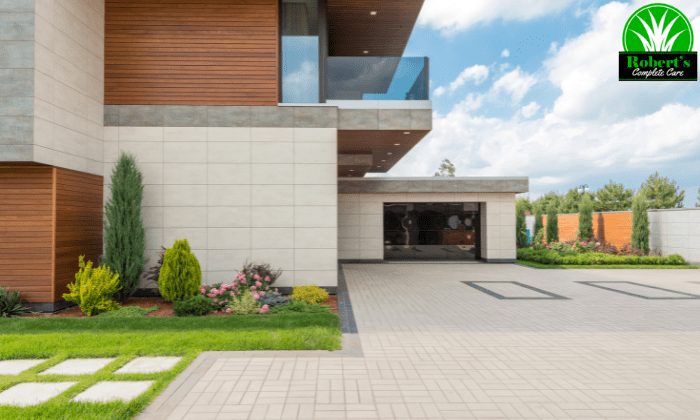Stamped Concrete Driveway Constructor

Stamped concrete driveways are a popular option for homeowners who are looking for a durable, attractive driveway that will last for years. They’re also great for businesses that need a consistent, professional look across their property. There are a few things to keep in mind when choosing a stamped concrete driveway: the type of stamping tool you’ll need, the size of the driveway, and the type of surface you’re working with.
For the most part, these factors will determine how detailed your stamped concrete driveway will be.
- If you’re working with an existing surface like asphalt or clay, you’ll likely only need to use basic stamps.
- But if you’re paving over something rougher, like gravel or stone, you’ll need to invest in a more sophisticated stamping tool.
- Finally, if you want your stamped concrete driveway to look really professional and uniform, it’s best to go with a high-quality surface like cedar planks or granite slabs.
- Overall, stamped concrete driveways are an excellent choice for anyone looking for durability and beauty. Just be sure to choose the right tools and materials for the job at hand!
Concrete Driveway Repair
Concrete driveways are a popular choice for homeowners, as they are strong, durable and weatherproof. However, like any other type of driveway, concrete can occasionally experience damage. If this damage is not repaired quickly, it can lead to serious consequences, including cracks in the concrete that allow water and ice to penetrate, and even structural failure.
When repairing a stamped concrete driveway, there are a few things to keep in mind.
- First, always use the correct tools for the job. Concrete is a very hard material, and using the wrong tools can cause more damage than good.
- Second, make sure to use the right techniques when repairing the driveway. Trying to force something into a hole that isn’t wide enough can cause even more damage than doing nothing at all.
- Finally, be patient – repairs taken too quickly may end up costing more in the long run.
Concrete Driveway Sealer
Concrete driveway sealer is a key ingredient in keeping your driveway looking pristine and new. Not only does it protect the surface from the elements, but it also helps to keep the concrete looking its best for years to come. There are a variety of types of sealers available on the market, so be sure to choose one that is specifically designed for concrete. Some sealers are water-based while others are oil-based. It is important to research which type of sealer will work best for your specific driveway situation.
Once you have selected a sealer, be sure to apply it according to the manufacturer’s instructions. Be sure to wear gloves and avoid getting any product on your skin or clothes. Once applied, leave the sealer to dry before walking on the driveway. If you notice any signs of wear or deterioration, be sure to re-apply the sealer as necessary. By following these simple steps, you can keep your driveway looking new and pristine for years to come!
Cost Of Concrete Driveway
There is no doubt that a concrete driveway is one of the most cost-effective and long-lasting additions to your home. But how much does a typical driveway cost? And is there a difference between standard and premade concrete driveways?
- When it comes to driveway costs, you’ll typically pay between $5,000 and $15,000 for a standard, freshly poured concrete driveway.
- However, if you’re looking for an already finished driveway that’s ready to be installed, you can expect to pay anywhere from $8,000 to $25,000.
- And if you want something more unique or custom-made, your driveway costs could reach upwards of $30,000.
So what’s the difference between standard and premade concrete driveways? Premade driveways are typically made from precast panels that are shipped directly to your home. This means that all you have to do is set it up and walk on it – no troweling required! Plus, premade driveways are often more affordable than custom ones because they’re made in bulk. However, if you’re looking for something truly unique – or just don’t want the hassle of construction – then a premade driveway may not be the best option for you. In that case, consider opting for a standard concrete driveway instead. Either way, your wallet will thank you!
Modern Concrete Driveway
When it comes to driveway design, there are a number of choices available to homeowners. From traditional concrete driveways to more modern variations such as gray concrete, there is a driveway design that will fit the needs and style of your home. Stamped driveways are a popular choice for many homeowners because they are durable and look great on any property. They also come in a variety of colors and styles, so you can find one that fits your unique personality and home décor.
If you’re looking for a more modern driveway design, consider opting for gray concrete. This type of driveway is both unique and trendy, and it will show off your home’s style perfectly. Gray concrete is also very resistant to weathering, so it will hold up over time.
Whatever driveway design you choose, be sure to get help from a qualified professional in order to ensure that the finished product looks great and meets your specific needs.
Asphalt Vs Concrete Driveway
Asphalt vs Concrete Driveways – The Debate When it comes to driveway options, many homeowners are faced with the choice between asphalt and concrete. While both materials have their benefits, which one is right for your home?
- Asphalt driveways are generally cheaper to install than stamped concrete driveways, and they’re also more durable. However, they can be less flexible than concrete driveways, which may be a problem if you need to make changes to your driveway in the future.
- Additionally, asphalt can become cracked or damaged over time if it’s not treated properly. Concrete driveways are more expensive to install, but they’re also much more resistant to wear and tear.
- They may be unable to accommodate certain types of vehicles, however, so be sure to test out a few different models before making a decision. In addition, depending on the type of cement used, a concrete driveway may emit some chemical smells over time.
Sealing Concrete Driveway
Sealing concrete driveways is an important step in protecting them from weathering and staining. Over time, the elements can cause the surface of the driveway to crack, peel, and even crumble. Sealing the asphalt layer also protects it from moisture and debris that can damage the underlying concrete. There are a few different types of sealants available for use on stamped concrete driveways.
- The most common is an epoxy sealant, which is a three-step process that begins with applying a base coat to the driveway. This will help to prevent fading and cracking while providing a tough surface for the sealant to adhere to.
- Next, an epoxy topcoat is applied, followed by a final protective coat of varnish or paint. All three coats must be fully cured before driving on the driveway. If left uncoated, rainwater and other contaminants can seep under the surface and cause damage over time.
- Once sealed, epoxy sealants are extremely durable and resistant to most chemicals and solvents. However, they should not be left unprotected in direct sunlight or near heat sources like fireplaces or grills – both of which can cause them to fail prematurely.
Concrete Driveway Crack Repair
Concrete driveways can be a very important part of any home, and can often last for many years without any issues. However, over time, cracks can form in the concrete due to various factors. If you notice a crack in your driveway that is getting bigger, or if it seems to be developing into a larger problem, there are a few steps you can take to try and repair it.
- First, you’ll want to try and determine the cause of the crack. This may involve reviewing footage of the area before and after the crack developed, looking for any changes in weather conditions or construction nearby that might have caused it, or simply talking to those who have used the driveway in the past. Once you know what’s causing the damage, you can start working on finding a solution.
- One option is to seal off the crack with a temporary fix using epoxy or another type of adhesive. This will prevent further damage from occurring while you work on finding an permanent solution.
- If sealing isn’t an option for some reason, then you might need to replace parts of the concrete driveway that are cracked or damaged. This could involve replacing entire sections of pavement, or just repairing individual cracks. whichever option is necessary will depend on how badly the crack has deteriorated and what kind of materials are available locally.
Regardless of what step is ultimately needed, taking steps to repair a stamped concrete driveway crack is always best prevention strategy. By addressing the issue early on, you can avoid more
Cost To Remove And Replace Concrete Driveway
When it comes to driveway resurfacing, the cost can vary greatly depending on the size of the project, the type of concrete used, and any special requirements or extra steps required. In general, though, a concrete driveway should not be considered an expense that is easily overlooked – a poorly done job can quickly become dangerous and expensive to fix. If you’re considering replacing your concrete driveway, there are a few things to keep in mind.
- The first is the cost of materials; this will largely depend on the size of your driveway and what kind of concrete is being used.
- Next, consider the labor involved; this will largely depend on how much work needs to be done (e.g., removing old asphalt, grinding new concrete) and who will be doing it.
- Finally, factor in any necessary permits or licenses – most municipalities require formal approval before any work can begin on a concrete driveway.

